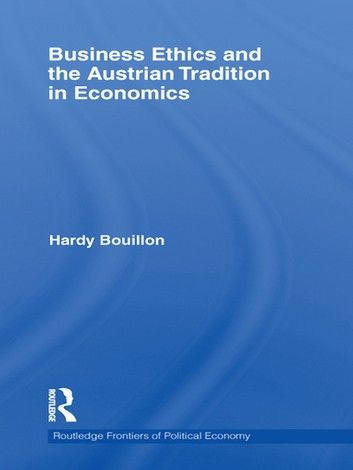| FindBook |
有 1 項符合
Business Ethics and the Austrian Tradition in Economics的圖書 |
 |
Business Ethics and the Austrian Tradition in Economics 作者:Hardy Bouillon 出版社:Taylor & Francis 出版日期:2011-03-06 語言:英文 |
| 圖書館借閱 |
| 國家圖書館 | 全國圖書書目資訊網 | 國立公共資訊圖書館 | 電子書服務平台 | MetaCat 跨館整合查詢 |
| 臺北市立圖書館 | 新北市立圖書館 | 基隆市公共圖書館 | 桃園市立圖書館 | 新竹縣公共圖書館 |
| 苗栗縣立圖書館 | 臺中市立圖書館 | 彰化縣公共圖書館 | 南投縣文化局 | 雲林縣公共圖書館 |
| 嘉義縣圖書館 | 臺南市立圖書館 | 高雄市立圖書館 | 屏東縣公共圖書館 | 宜蘭縣公共圖書館 |
| 花蓮縣文化局 | 臺東縣文化處 |
|
|
Stakeholder value, corporate social responsibility and sustainability: Are these, and similar, concepts sufficiently clear for fruitful research in business ethics? What is the benchmark to prove their utility? Business Ethics and the Austrian Tradition in Economics is a treatise on the fundamental questions of business ethics and addresses significant shortcomings in the field. It is the result of correlating reflections on phenomena, resulting from an intersection of ethics, economics, methodology, and political and social philosophy. Sparked by the business ethicists’ tendency to consider certain areas outside their field and accept others unquestioningly, this book provides answers in the tradition of Austrian Economics and, in particular, of Hayek and Popper.
Through detailed examination and reflection, this book presents the thesis that many themes in business ethics are discussed either unduly intensely, unbalanced or rarely, measured against what business ethics as a science should deliver. It does so by offering an answer to one of the most crucial questions in business ethics, namely that of justice in moral economic actions. Bouillon develops an original definition of morally just economic action in the course of three chapters, and subsequently uses it as yardstick, from which, in chapter four, he reads which of the relevant concepts and topics in business ethics ask for restatement. As a side-product Bouillon discloses logical inconsistencies in prominent political philosophies, and the consequences of these inconsistencies for maldevelopments in business ethics.
Business Ethics and the Austrian Tradition in Economics illustrates and analyses the business etchics’ peculiarities particularly within German literature, providing the reader with a focus rarely found elsewhere. This book should be of interest to economics postgraduates and researchers looking at business ethics, economic theory, and social and political philosophy.
|









